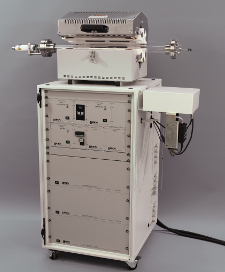CATLAB-FB

For further information and pricing, please get in touch with us.
Horizontal Furnace/MS System for Catalyst Core Quantification
The CATLAB-FB is a combined furnace and mass spectrometer system for the analysis of catalyst core specimens at temperatures up to 1000°C, with multi-stream gas/vapour flow control and mass spectral analysis of both feed and downstream gases.
Applications
The furnace houses a horizontal quartz reactor tube with in-bed thermocouple for optimum thermal precision, a standard internal diameter of 26 mm and a uniform central hot-zone of 150 mm. The furnace is programmable from 50°C through to 1000°C at a fastest ramp rate of 20°C/minute. The system has capacity for up to 12 mass flow controlled gas streams, selectable with flow rates from 0.1-10 L/minute and for operation with corrosive feed gases.
Options also includes a pulse chemisorption (PCS) mode for injection of sorbates to the reactor and a vapour feed system to enable vapour reaction characterisation in both PCS and continuous flow modes. All system elements are programmable from the integrated control program together with mass spectrometer data acquisition, data display and data interpretation.
There is also the possibility that a customer supplied furnace can be integrated into the CATLAB-FB set-up.
Presentations
CATLAB Software – Complete Control of Experimental Parameters
Posters
A TPD-MS Study of Novel Hydrogen Storage Materials
Application of Pd Catalysts for the Hydrogenation of Nitriles
Gas Phase Hydrogenation of 1,3-Pentadine, an FTIR Study
New Mesoporous Silica Supported Nickel Catalysts for Biomass Conversion
Plasma Modification of Catalysts Using a Dielectric Barrier Discharge
Plasma Modified Nickel Catalysts for Biomass Conversion
Reaction of Steam and Methane over Novel YSZ-LaB6 Composities and Nickel-YSZ Cermets
The Hiden CATLAB delivers a range of completely automated, dynamic, temperature programmed, pulse chemisorption and isothermal techniques.
Template driven CATLAB software provides automatic control of gas composition and delivery, temperature ramp and set-point as well as full mass spectrometer parameter controls – a true first for the catalyst researcher. The standard system has 0-200 amu capability with options extending this to 1000 amu.

